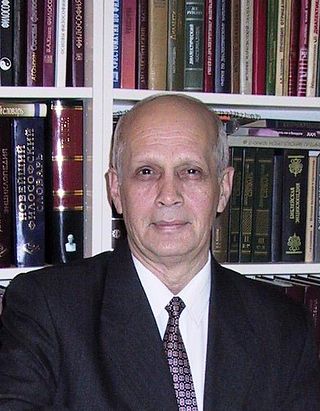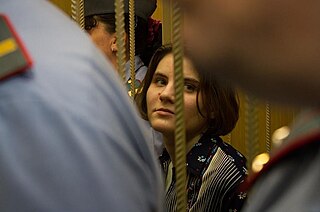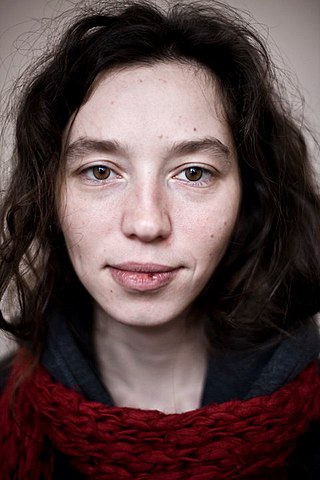
Merab Mamardashvili was a Georgian philosopher.
William Marias Malisoff, also William Marias Malisov, was born in Ekaterinoslav, Russia, now Dnipro Ukraine, immigrated to the United States as a child, and became a naturalized United States citizen. Malisoff obtained a BS in 1916, an MA in 1917 and CE in 1918 degrees from Columbia University and a PhD. from New York University in 1925. Malisoff was an associate professor of biochemistry and lecturer in philosophy at University of Pennsylvania from 1922 to 1934. From 1934 to 1942 he was associate professor of biochemistry at Brooklyn Polytechnic Institute. In 1938-1939 Malisoff was delegated NEC member of University Federation for Democracy and Intellectual Freedom. He owned and operated United Laboratories, Inc, a company principally engaged in research on lubricating processes for chemical products, war industries and biochemistry. In 1934 he founded the Philosophy of Science journal and served as its first editor until his death in 1947. From 1936 to 1942 he was a regular contributor on science and technology to the New York Times Book Review. Also Malisoff, with Niels Bohr, Bertrand Russell, Ernest Nagel et al sat on the Advisory Committee of the International Encyclopedia of Unified Science. In 1945 Malisoff was connected with the Institute for the Unity of Science for a short time. Chemical researcher Kapok-Milkweed project, United States Navy, 1944; Essex College of Medicine, Newark, New Jersey, 1945–1946; Director of research Longevity Research Foundation, New York, since 1946.

Alexander Moiseyevich Piatigorsky was a Soviet dissident, Russian philosopher, scholar of Indian philosophy and culture, historian, philologist, semiotician, writer. Well-versed in the study of language, he knew Sanskrit, Tamil, Pali, Tibetan, German, Russian, French, Italian and English. In an obituary appearing in the English-language newspaper The Guardian, he was cited as "a man who was widely considered to be one of the more significant thinkers of the age and Russia's greatest philosopher." On Russian television stations he was mourned as "the greatest Russian philosopher."
Voina is a Russian street-art group known for their provocative and politically charged works of performance art. The group has had more than sixty members, including former and current students of the Rodchenko Moscow School of Photography, Moscow State University, and University of Tartu. However, the group does not cooperate with state or private institutions, and is not supported by any Russian curators or gallerists.
Alexander Zorich is the collective pen name of two Russo-Ukrainian writers; Yana Botsman and Dmitry Gordevsky. The two write in Russian, in genres such as science fiction, fantasy and alternate history, as well as PC game scenarios.
Natalia L’vovna Zhukovskaia is one of the foremost scholars working on Buryat, Mongols as well as other Mongolic peoples history, culture, and religious life.

Victor Ovcharenko was a Russian philosopher, sociologist, historian and psychologist. He also was a PhD., professor, academician of the Russian Academy of Natural Sciences (1997), academician of the Academy for Humanities Research (1998) and academician of the Academy of Pedagogical and Social Sciences (2000). He co-edited the journals The Psychoanalytical Bulletin, The Bulletin of Psychoanalysis, etc. He was a forerunner of the Minsk philosophical school "Humanities Encyclopedia". He is considered one of the founders of modern Belarusian sociology.
Elisabeth Schellekens is a Swedish philosopher and Chair Professor of Aesthetics at Uppsala University. Previously, she was Senior Lecturer at Durham University (2006-2014). Schellekens is known for her works in aesthetics. Her research interests include aesthetic cognitivism and objectivism, aesthetic normativity, Hume, Kant, aesthetic and moral properties, conceptual art, non-perceptual or intelligible aesthetic value, the relations between perception and knowledge, the aesthetics and ethics of cultural heritage, and the interaction between aesthetic, moral, cognitive and historical value in art.
Alla Yervandovna "Yervandi" Ter-Sarkisiants was a historian and ethnographer of Armenia, doctor of historical sciences, leading specialist of the Caucasus department of N. N. Miklukho-Maklai Institute of Ethnology and Anthropology of the Russian Academy of Sciences, and a corresponding member of the Russian Academy of Natural Sciences.

Mark Galeotti is a British historian, lecturer and writer on transnational crime and Russian security affairs and director of the consultancy Mayak Intelligence. He is an honorary professor at the UCL School of Slavonic and East European Studies, a senior associate fellow at the Royal United Services Institute, and an associate fellow in Euro-Atlantic geopolitics at the Council on Geostrategy.

Yekaterina Stanislavovna Samutsevich is a Russian political activist. She was a member of the anti-Putinist punk rock group Pussy Riot.

Natalia Sokol, aka Koza, is the leader of the Russian highly political art-group Voina.
VictoriaReiflerBricker is an American anthropologist, ethnographer and linguist, widely known for her ground-breaking studies of contemporary and historical Maya culture.
Ruth Mace FBA is a British anthropologist, biologist, and academic. She specialises in the evolutionary ecology of human demography and life history, and phylogenetic approaches to culture and language evolution. Since 2004, she has been Professor of Evolutionary Anthropology at University College London.
Dame Karin Judith Barber, is a British cultural anthropologist and academic, who specialises in the Yoruba-speaking area of Nigeria. From 1999 to 2017, she was Professor of African Cultural Anthropology at the University of Birmingham. Before joining the Centre of West African Studies of the University of Birmingham, she was a lecturer at the University of Ife in Nigeria. Since 2018, she has been Centennial Professor of Anthropology at the London School of Economics.
Susanne Küchler, FBA is a German anthropologist and academic, who specialises in material culture. Since 2006, she has been a professor at University College London. She previously worked at the University of East Anglia and the Johns Hopkins University.
Valeriya Nikolaevna Kirpichenko was a Russian orientalist, translator, and philologist, specialising in Arabic literature.

Maryna Tkachuk is a Ukrainian historian of philosophy, Dean of Faculty of Humanities of National University of Kyiv-Mohyla Academy. She was awarded the state award "Honoured Figure of Science and Technology of Ukraine" in 2015.

Keti Chukhrov is a Russian poet and academic, art theorist and philosopher. Doktor Nauk in Philosophical Sciences (2013), Candidate of philological sciences (1998), Docent at the National Research University Higher School of Economics.
Yulia Vadimovna Sineokaya is a Russian philosopher, specialising in the history of European and Russian philosophy. Doctor of Sciences in Philosophy (2009), Professor of the Russian Academy of Sciences (2015), Corresponding member of the Russian Academy of Sciences (2019).








